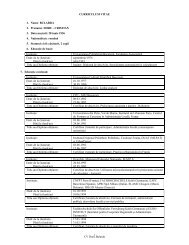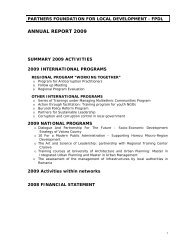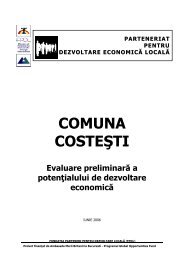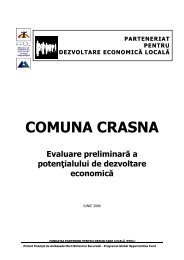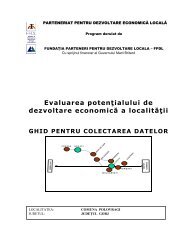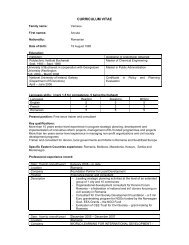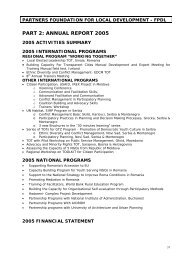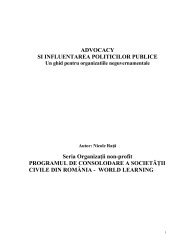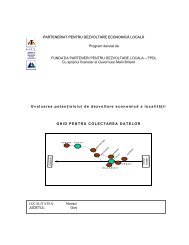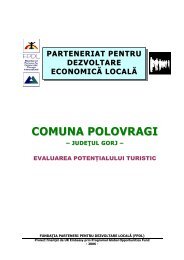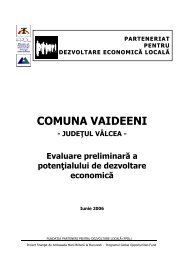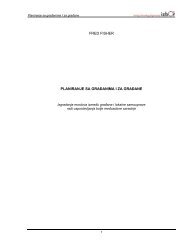Organizational Development: A Manual for Managers and ... - FPDL
Organizational Development: A Manual for Managers and ... - FPDL
Organizational Development: A Manual for Managers and ... - FPDL
Create successful ePaper yourself
Turn your PDF publications into a flip-book with our unique Google optimized e-Paper software.
aggression can make the trajectory of ‘independent’ individual behaviour too objectionable. On the<br />
other h<strong>and</strong>, the very fact of pooling others into the socion changes the situation <strong>and</strong> can make<br />
individual behaviour unprofitable (it drastically reduces the chances of gain).<br />
There<strong>for</strong>e, the <strong>for</strong>ming socion can serve as an ‘attractor’, to attract trajectories of individual<br />
behaviours <strong>and</strong> involve them in a kind of complex behaviour – that of an emerging entity. This<br />
process will continue until the increase in the number of participating parts over a certain maximum<br />
leads to reduced effectiveness of the entity – diminishing to the level of effectiveness of individual<br />
behaviour. Then socion will refuse additional new members <strong>and</strong> even actively resist their possible<br />
intervention. It is also possible that changing conditions will require society to diminish the size of<br />
its membership in order to remain effective. Then it will eliminate the elements that play a less<br />
important role in creating the general emergent effect of cooperation.<br />
In socion/society, each element depends on others, thus cooperation creates specific vulnerability<br />
that may be fatal <strong>for</strong> any one if others do not follow agreed upon patterns of behaviour. There<strong>for</strong>e,<br />
cooperation of any subject is only possible when they meet certain requirements related to<br />
confidence. Some requirements are specific <strong>and</strong> are based on particular rules of coordinating<br />
actions in this given socion/society. However, other requirements are general <strong>and</strong> do not depend<br />
on the kind of entity. For example - providing others with correct in<strong>for</strong>mation (telling the truth), or<br />
following an agreed upon trajectory even when changing circumstances make it extremely<br />
inconvenient (keeping promises). These simple requirements are common <strong>for</strong> any kind of<br />
imaginable socion/society – <strong>for</strong> a team of astronauts in a satellite, or <strong>for</strong> a gang of criminals. A lack<br />
of perceived mutual confidence makes cooperation highly risky <strong>for</strong> each subject, <strong>and</strong> there<strong>for</strong>e,<br />
very irrational. On the other h<strong>and</strong>, excessive reliability with respect to partners creates serious<br />
restrictions to flexibility in one’s own behaviour. In some cases, belonging to socion/society may be<br />
disadvantageous. The only relevant issue may be – what is the pay off?<br />
When the emergent effect of coordinated interaction is divisible, it is common to call this kind of<br />
socion a cooperative. The total gain may be divided among participating parties in accordance with<br />
their contribution, power, value as perceived by others, etc.<br />
When the effect of co-operation is indivisible – then we are speaking about a commune. Some<br />
specific benefits of cooperation between people who live together (at least in the same vicinity)<br />
cannot be taken away – like clean <strong>and</strong> well-lighted streets, a healthy environment, safe public<br />
places, etc. Access to the benefits of cooperation sometimes cannot be withheld from those who<br />
did not contribute to creating the benefit. Then those who contributed may decide to use their<br />
combined power to <strong>for</strong>ce ‘non-contributors’ to contribute.<br />
69



